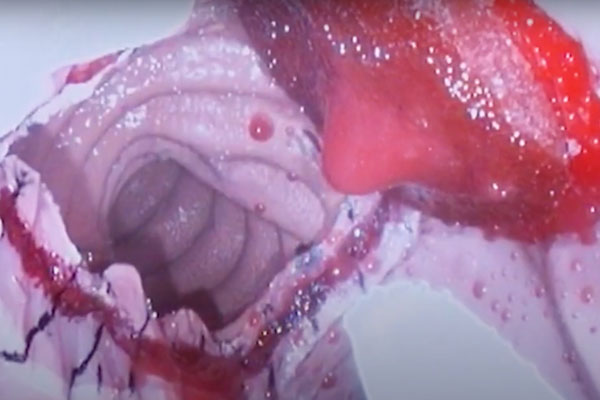An animal-free endoscopy simulator for medical training
- News
DAAE supports the development of an animal-free training phantom in Tübingen
The Experimental Endoscopy, Development and Training working group at the University Hospital of Tübingen invests significant amounts of time and energy into the development of humane, animal-free endoscopy training phantoms .There is hardly any public funding for this. Our association Doctors Against Animal Experiments (DAAE) has therefore funded the development of a bleeding model of the lower gastrointestinal tract, on which future doctors can realistically practice various life-saving interventions, with a sum of € 7,500. After successful completion of the simulator, DAAE was invited for a demonstration at the facility in Tübingen. The visit also resulted in an informative short film.
Click here to watch the film >>
In 2020/2021, DAAE conducted a survey among surgery course providers in Germany as part of the Surgery Campaign and found that one-third of surgical training courses still use animals for training. Apart from the ethical issue of abusing animals as training objects, the use of animals for surgical training also poses significant risks for the treatment of human patients, although these courses are designed to teach and develop potentially life-saving expertise. The anatomy and dimensions of animals such as pigs, sheep, and of isolated animal organs differ considerably from human anatomy. In addition, animal germs or parasites can be harmful to human health.
But there are alternatives: Dr Dörte Wichmann and her team at the University Hospital of Tübingen are developing innovative models that accurately reflect the human anatomy without using animal materials. This working group, which has been involved in the planning and production of theoretical and practical models for more than 30 years, offers training courses for medical professionals; not only locally in Tübingen, but also internationally, from New York to Tokyo.
As part of their project "Training hemostasis in endoscopy and surgery with an animal tissue-free model", a device was developed specifically for the treatment of bleeding in the lower gastrointestinal tract. This type of bleeding is particularly critical as it is often recognized late, and in such cases every minute is crucial.
A key aspect in the development of these models was the complete waiver of animal components. While most of the materials used were already vegan, the dye in the artificial blood posed a challenge. After intensive research and adaptation of iron oxide pigments, a suitable blood solution was developed to realistically practice hemostasis.
The models are handmade using 3D printers, with the intestine lined with synthetic mucosa (mucous membrane) to realistically reproduce the human anatomy. The entire model was integrated into a plastic human torso.
The project was concluded by a visit of DAAE in Tübingen, where an exciting demonstration of the training model took place. Dr Dörte Wichmann performed the endoscopy on the model and project leader Dr Benedikt Duckworth-Mothes held a lecture. Surgeon Dr Wolf-Dieter Hirsch, an active DAAE member, accompanied the visit and was impressed by the realistic training possibilities of the animal-free model. "I think the advantages of the realistic simulation of normal human anatomy in particular, as well as various conditions after surgeries and the practice of different pathologies and endoscopic treatments is absolutely convincing and clearly worthy of support!" said the Specialist in General and Visceral Surgery, Orthopaedics, Trauma Surgery and Emergency Medicine.
This pioneering training model has already received awards. Nevertheless, the question arises why such projects are not funded by large research organizations. DAAE affirms that non-animal training courses are of crucial importance in the medical field.
"We are delighted with this project, which represents a significant step towards animal-free training courses in medical education and training and can ensure the health and well-being of future patients," concludes Dr Hirsch.
Click here to watch the film >>

Dr Wolf-Dieter Hirsch and Dr Dörte Wichmann demonstrating an endoscopic procedure with the simulator.

Part of the modell.

Realistic simulation.

